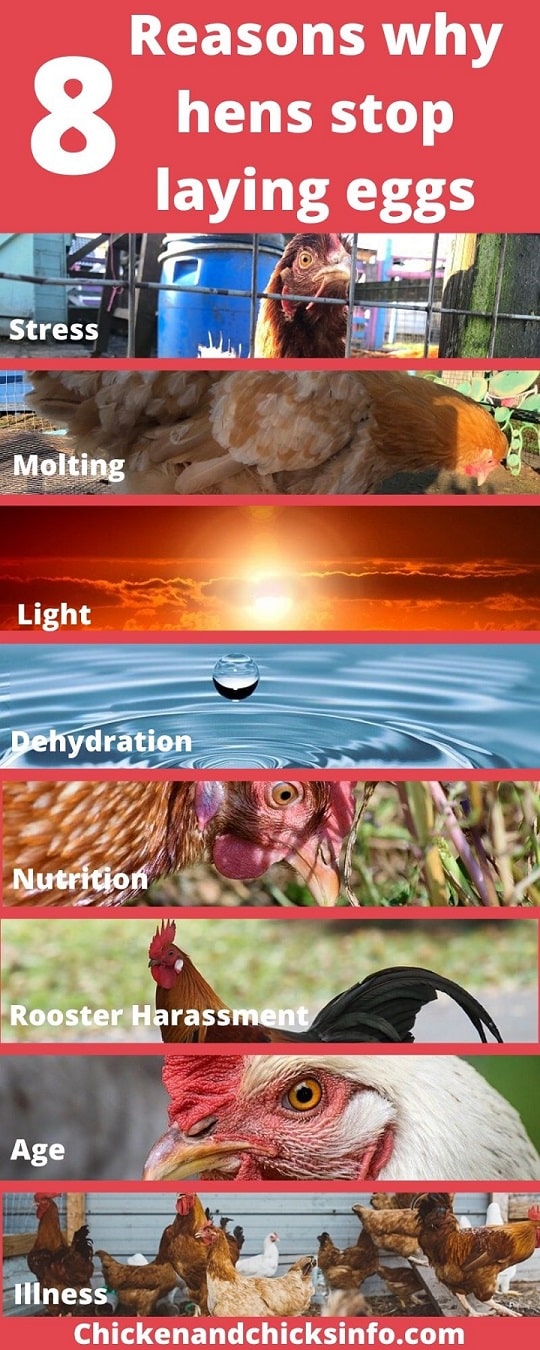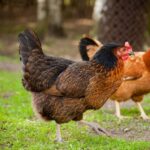It can be quite worrying when a hen or several hens suddenly stop laying. There is often a simple reason and an easy solution however, you just need to know what the reason is.
If you’re looking for common reasons as to why do chickens stop laying eggs? Read on for 8 of the most common reasons to explain this change in laying behavior.
Table of Contents
8 Reasons Why Chickens Stop Laying Eggs
Stress
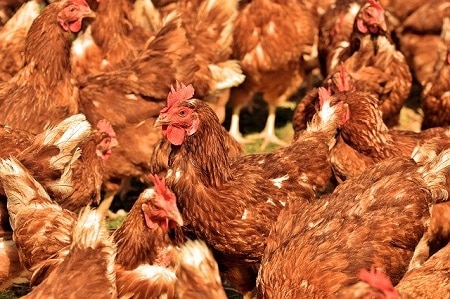
When chickens are stressed their health starts to suffer, and they will produce fewer eggs.
There are many factors that can cause stress; fighting with other chickens, cramped or overcrowded conditions, predators, illness, poor nutrition, and other environmental factors.
To give you chickens and their coop a stress audit, look at the following:
Make sure there is at least 4 sq ft of space per each chicken in their coop, and 5-10 sq ft of space where they roam outdoors.
You should have at least 1 nesting box per 4 hens, but could try adding more if this is the issue.
Look for signs of fighting by checking their combs and wattles for damage. Any signs of fighting and you’ll need to start separating hens.
Make sure predators are not getting into the coop or spooking them nearby.
Check the coop for signs of damage, damp, breezes and other things may be bothering your chickens.
Chickens are very adept at dealing with a wide range of temperatures and weather. But they need somewhere comfy and safe to relax when the weather is bad.
Depending on how cold it gets where you live, you might need to provide some hearing in the winter. The more comfortable you can make them, the happier they’ll be. The happier chickens are, the more they lay eggs.
Related content - which predators bite the heads off chickens?
Molting
In fall, as the temperature drops and days shorten, chickens will renew their feathers to adjust to the cooler weather.
This is called molting. Chickens start molting at around 18 months of age and will go through a molt every year after.
During the molting period, which typically lasts 8-16 weeks, chickens will stop laying eggs. It takes a lot of energy and nutrition from their bodies to grow a new coat of feathers, so egg production goes on hold.
It’s recommended you switch to a higher protein feed during this period. Once they have their new feathers normal egg-laying will resume.
Not Enough Light
The miracle of how eggs produce and lay eggs is triggered by light. They also need a minimum of 16 hours of daylight to keep producing eggs on a regular basis.
This is why chickens typically lay fewer eggs during the winter months. Some backyard chicken owners accept they’ll lay less during winter, and use this period to give their chooks a well-deserved rest.
You can provide artificial light when there isn’t enough natural sunlight. If you want your chickens to lay all year round you need to introduce artificial light as the days start getting shorter.
Dehydration
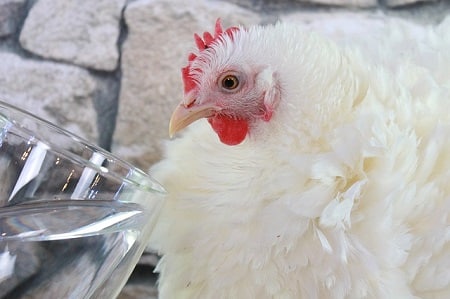
Water is the most important part of a chicken’s overall nutritional intake. Chickens are made up of around 50% water, and their eggs are around 65% water.
So, it’s essential that they are drinking enough water on a daily basis.
If a chicken is not drinking enough, egg production will reduce or stop completely. There are also a number of other ailments that will become present, such as diarrhea, lethargic behavior, and so on.
Clean, fresh drinking water is essential too. You should be putting out fresh water daily. Old water can become contaminated with bacteria and cause illness. Don’t be surprised if a flock of a dozen or so birds are getting through 5-6 liters of water per day.
Poor Nutrition
It’s not easy producing eggs! Laying hens require around 38 key nutrients in their diet to keep you a constant supply of eggs.
One of which is calcium, which is what eggshells are made from. A laying hen must consume four grams of calcium each day to ensure they can produce an egg.
If they aren’t getting a well-balanced diet, egg production will be affected. I’ve covered various treat foods that are good for chickens in small amounts, as well as some that aren’t.
The bottom line is that you should be providing your chickens their formulated chicken feed daily and this should make up at least 90% of their diet. That other 10% is where you have room for treats and table scraps.
Related content - Herbs that are great to supplement a chicken's diet.
Rooster Harassment
An overactive rooster in a flock can cause a few problems for your hens. If he’s mounting and mating with a hen too often, which can happen, it can stress the hen and affect how routine her egg laying is.
You may not have seen a rooster mating with a hen - after all, it only takes a couple of seconds - but it can be quite traumatizing.
To mate with a hen, a rooster will mount her and dig his spurs into her sides and grab a hold of her near the neck. This can cause a bald patch from the friction and their claws, as well as break the skin sometimes.
You can get saddles to put on hens that are being mounted too often and suffering injuries. This helps lessen injuries but doesn’t lessen the stress of being harassed. You may have to separate the rooster and give him a timeout to let your hens recover.
Related content - Can roosters live alone?
Age (Too Young or Too Old)
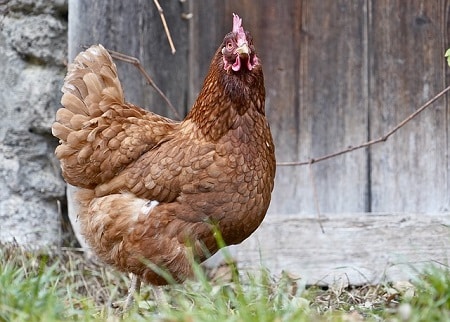
The age in which hens start to lay eggs, and start to slow down laying eggs varies depending on breed and general health.
As a general rule, however, chickens start laying eggs around 18-20 weeks old. Most of the main egg-laying breeds will be able to produce around 260-280 eggs a year if all their requirements are met.
There’s no set age when a chicken will stop laying eggs. Some chickens will stop at some point, and some never will. All hens will slow down as they get older though (who can blame them!).
Generally speaking, hens have a lifespan of 8-10 years, and they will be at their peak laying potential for 5-7 years. If your chicken has stopped laying and she’s around 8-10 years this will almost certainly be the reason.
Illness
A sick chicken is not going to be keeping to a healthy laying schedule. Backyard chickens are typically healthy and few problems occur when you do everything right to minimize disease and illness.
Sometimes they will get sick, however, and there is nothing you can do to stop it. Some common diseases and illnesses range from Fowl Pox, Infection Coryza, and Avian Influenza, to more routine problems like worms and parasites.
A sick hen is not a happy hen, and she will not be on her best form. It’s a good idea to get your girl checked out if you can rule out all the other potential reasons.
Some worms and parasites will only be detected when testing their feces or a checkup with an experienced vet.
Related content - How to use Valbazen for chickens with worms.
In Summary
Hopefully, this article has helped you find out the reasons and better understand why your chickens have stopped laying eggs.
In my experience, it’s almost always something that can be easily resolved. You should be back to collecting delicious daily eggs in no time!
Some Other Related Questions and Answers
Why Do Chickens Stop Laying Eggs in Winter?
It’s not uncommon for chickens to stop laying, or at least lay a lot less during the winter. As I explained above, light is a huge factor in how often hens lay eggs. During the winter months, there is less natural light
If they are exposed to less than 16 hours of light a day, either natural or unnatural, they might not lay at all. Cold weather is also a factor, some chickens lay less when it's cold due to using more of their resources to keep warm.
Why Do Chickens Stop Laying Eggs in Summer?
Long daylight hours and warm temperatures are great for egg-laying chickens. If it’s too hot, however, or if they’re not keeping well hydrated it can have a negative impact on how many eggs they lay.
Chickens perform best at around 75 degrees and below. If you’re experiencing a hot summer they might be suffering from heat stress.
Why Do Chickens Stop Laying Eggs in Spring?
There aren’t really any reasons specific to the season of spring that might be causing it. Take a look through the 8 reasons I listed above and see if you can eliminate any and narrow down the possible causes.
Why Do Chickens Stop Laying Eggs in Fall?
Late fall or autumn as it’s called in other parts of the world is typically when chickens will molt. Whey they’re molting the egg production will slow down or stop altogether until they’ve finished molting.
With fall heading into winter, you also have a reduction in the number of hours of natural light and a drop in temperature. All factors that can affect egg production.
